Understanding Tying-Up in Athletic Horses

Our understanding of muscle disease has come a long way since the days of “Monday morning sickness,” a muscle disease of draft horses characterized by spasms and lameness that occurred after a work-free weekend. Katie Young, Ph.D., a Kentucky Equine Research nutritionist, recently spoke with the Women’s Professional Rodeo Association about the clinical signs of muscle disease in modern athletic horses and how to best manage affected horses.
During a webinar that aired on June 9, Young discussed different types of equine myopathies, including polysaccharide storage myopathy, recurrent equine rhabdomyolysis, and myofibrillar myopathy. She highlighted the causes, diagnosis, and treatment of each myopathy. As she mentioned in the webinar, management strategies for diagnosed horses often depend on a fine-tuned diet, including targeted supplementation, and abundant turnout. In many instances, horses that are managed properly can perform well without showing clinical signs of disease.
Young began working for Kentucky Equine Research in 2019 after extensive experience in the feed industry working for both regional and national feed companies.
Kentucky Equine Research has worked for more than 30 years to find ways to properly nourish high-performance horses, including those diagnosed with different myopathies, often collaborating with leading researchers to better the well-being of all horses.








